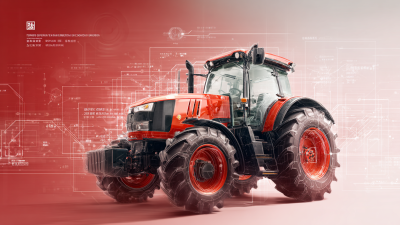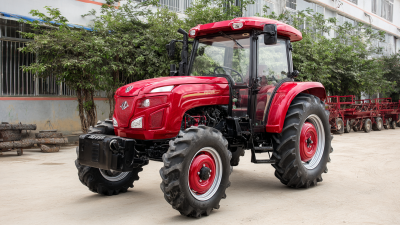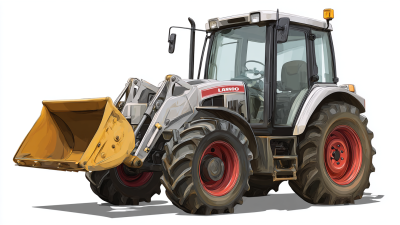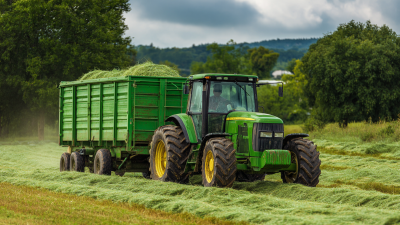In recent years, the demand for mini tractors has surged, driven by the growing need for efficiency in small-scale farming. According to a report by the Agricultural Equipment Manufacturers Association, the market for compact tractors has seen an annual growth rate of 5.3%, reflecting a significant shift toward more versatile and efficient farming tools among smallholders.

Mini tractors offer an ideal solution for farmers looking to maximize productivity while minimizing labor and operational costs. These compact machines are designed to navigate tight spaces and handle various tasks, from tilling to planting, making them indispensable for modern sustainable agriculture.
As we delve into the alternatives available in the market, it's crucial to consider not only the specifications and capabilities of mini tractors but also how these options can enhance farming practices and contribute to overall efficiency on small farms.
When it comes to small scale farming, selecting the right equipment is crucial for maximizing efficiency and productivity. Mini tractors have emerged as a popular choice due to their versatility and maneuverability in tight spaces. However, with various models on the market, identifying the ideal mini tractor tailored to specific farming practices can be challenging. Key factors to consider include engine capacity, weight, and the types of attachments available, which can significantly impact functionality and ease of use.
Another important aspect is the tractor's suitability for various farming tasks. Whether it’s tilling, planting, or hauling, the right mini tractor should seamlessly integrate with your farming needs. Moreover, evaluating the tractor's fuel efficiency and maintenance requirements is essential, as these factors can influence long-term operational costs. Exploring alternatives such as electric mini tractors or specialized attachments can further enhance farming efficiency, allowing smaller operations to thrive without the burden of oversized machinery. Through thoughtful consideration of these elements, small scale farmers can confidently choose a mini tractor that not only meets their immediate needs but also contributes to sustainable farming practices.
In recent years, small-scale farmers have increasingly turned to mini tractors as viable alternatives to traditional farming equipment. A comparative analysis reveals significant differences between the two, particularly regarding efficiency and operational costs. According to a report by the American Society of Agricultural and Biological Engineers, mini tractors consume about 30% less fuel than their larger counterparts, making them an economically sound choice for farmers managing limited acreage. This reduction in fuel consumption not only lowers operational costs but also aligns with sustainability goals by minimizing carbon emissions associated with farming.

Moreover, mini tractors are designed to facilitate a greater range of tasks on smaller plots of land. Research from the Farm Equipment Manufacturers Association shows that these versatile machines can perform multiple functions, such as tilling, planting, and harvesting, often with attachments that are easily interchangeable. This adaptability allows small farmers to maximize productivity and effectively manage their operations without the need for multiple pieces of equipment. As small-scale farming continues to evolve, the shift towards mini tractors reflects a growing recognition of their role in enhancing efficiency and making farming more accessible.
When exploring mini tractor alternatives for small-scale farming, it's essential to understand the key features and specifications that can enhance your efficiency. Look for compact designs that provide maneuverability in tight spaces, as these are particularly beneficial for small farms. A robust engine is crucial; consider models with horsepower ranging between 15 to 30, which can handle various tasks without compromising power. Additionally, the weight of the mini tractor should be appropriate to prevent soil compaction while still being capable of pulling necessary implements.
Tip: Evaluate the attachments compatibility with your mini tractor. Choosing a model that supports a wide range of implements—like tillers, plows, and mowers—can significantly increase your farming versatility. This adaptability allows you to perform different tasks efficiently, thus maximizing productivity.
Another essential specification to focus on is hydraulic power. A good hydraulic system enables you to assist with lifting and controlling heavy loads, making farm tasks easier. Pay attention to the lift capacity and responsiveness of the hydraulic system, ensuring it matches your operational needs.
Tip: Always consider user-friendliness and maintenance requirements. Selecting a mini tractor with intuitive controls and readily available parts can save you time and reduce downtime, allowing you to focus more on your farming activities.
When considering the equipment needed for small scale farming, the choice between mini tractors and traditional hand tools is crucial for maximizing efficiency and profitability. Mini tractors offer the advantage of mechanization, allowing farmers to cover larger areas in less time, which can be particularly beneficial during critical planting and harvesting seasons. However, the initial investment in a mini tractor can be daunting for small farmers, as it often requires a significant upfront cost, maintenance expenses, and fuel consumption.
Conversely, hand tools present a cost-effective alternative, with substantially lower initial investment and ongoing expenses. They require no fuel, are easy to maintain, and can promote a greater connection to the land. Yet, relying solely on hand tools can be labor-intensive and time-consuming, potentially leading to reduced yields if tasks are not completed on time. A cost-benefit analysis reveals that while mini tractors may enhance efficiency and productivity, small farmers must carefully evaluate their budgets and operational needs to determine the most suitable option, balancing initial costs against long-term benefits.
As small scale farming continues to evolve, the integration of advanced mini tractor technologies is becoming increasingly significant in promoting sustainable practices. According to a report from the International Journal of Agricultural Technology, the global mini tractor market is projected to grow at a compound annual growth rate (CAGR) of 6.2% through 2025. This growth signals a rising recognition among farmers of the efficiency and productivity that these compact machines can bring to small farms.

Future trends indicate that mini tractors will be equipped with smart technology, including GPS and automated systems, enhancing overall farm management. The Global Agricultural Machinery Market Report highlights that 52% of farmers adopting precision farming techniques saw a significant reduction in resource waste, leading to more sustainable land practices. Furthermore, as these technologies become more affordable, they are expected to make sustainable farming accessible to a broader range of smallholders, allowing them to optimize resources like water and fertilizers and minimizing environmental impact. The advancement of electric mini tractors also promises to decrease carbon footprints, as evidenced by the increasing number of manufacturers diversifying their portfolios to include eco-friendly options.





